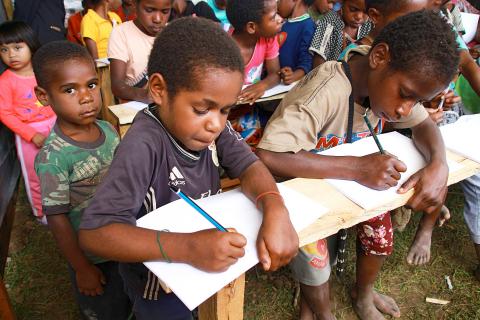Hundreds of students have fled fighting in Indonesia’s Papua Province, a local non-governmental organization said, amid unconfirmed reports of violent military reprisals after a massacre of civilian workers by separatist rebels.
The death of 16 government-linked employees at a remote jungle work camp in early December last year marked a dramatic escalation from decades of mostly sporadic skirmishes between poorly armed and disorganized guerrillas, and a powerful Indonesian military.
Subsequent clashes prompted the Nduga District government to evacuate more than 400 students to Wamena, the capital of neighboring Jayawijaya District, according to Humanitarian Volunteers for Nduga and a local education agency official.

Photo: AFP
“Some of the students are suffering from trauma,” said Ence Geong, a coordinator at the organization.
Scores of other residents are believed to have fled to neighboring districts or into the jungle amid allegations that soldiers carried out arson, harassment and killing of livestock and civilians, residents and activists said.
Resident Sripona Nirigi said that her elderly father, Gemin — a priest — was shot dead in December last year during a sweep of the area by the military.
His burned corpse was found by one of her siblings about two weeks later, she added.
Her account could not be independently verified.
Papua military spokesman Colonel Muhammad Aidi rejected allegations that the military had fired on civilians, calling it a “hoax.”
“If there are claims of civilian victims, they’re definitely not ordinary civilians,” Aidi said. “They are part of the [separatists] that are attacking the military.”
Aidi said that the army has investigated the alleged killing of the priest and denied he was shot by soldiers, saying it was still unclear whether he was alive or dead.
He added that two soldiers have been killed and several more were injured in clashes with rebels since the December massacre of workers who were building bridges and roads.
The rebels said they were legitimate military targets.
Local commander Binsar Sianipar confirmed that the students had been evacuated, but said it was due to a teacher shortage in the area, not the military presence.
Classes are being held in tents and the children are staying in overcrowded conditions at relatives’ houses, Geong said. About 80 teachers have joined them.
Military operations in Nduga have displaced at least 1,000 people, lawyer and activist Veronica Koman said.
“Jakarta ordered the military operation, but has been doing nothing to assist ... civilians [who are] now internally displaced persons,” said Koman, who is in contact with church leaders and activists in Papua. “I’ve seen credible photos and videos of burnt livestock and houses, including a sick old man burnt inside a house.”
Indonesian security forces have long been accused of rights abuses against Papua’s ethnic Melanesian population, including extrajudicial killings of activists and arrests of peaceful protestors.
Papua, which shares a border with Papua New Guinea, has been the site of low-level insurgency since the 1960s.
The former Dutch colony declared itself independent in 1961, but Indonesia took control of Papua two years later on the condition that it hold an independence referendum.
Jakarta annexed the mineral-rich region in 1969 with a UN-backed vote that is widely seen as a sham.

Yemen’s separatist leader has vowed to keep working for an independent state in the country’s south, in his first social media post since he disappeared earlier this month after his group briefly seized swathes of territory. Aidarous al-Zubaidi’s United Arab Emirates (UAE)-backed Southern Transitional Council (STC) forces last month captured two Yemeni provinces in an offensive that was rolled back by Saudi strikes and Riyadh’s allied forces on the ground. Al-Zubaidi then disappeared after he failed to board a flight to Riyadh for talks earlier this month, with Saudi Arabia accusing him of fleeing to Abu Dhabi, while supporters insisted he was

‘SHOCK TACTIC’: The dismissal of Yang mirrors past cases such as Jang Song-thaek, Kim’s uncle, who was executed after being accused of plotting to overthrow his nephew North Korean leader Kim Jong-un has fired his vice premier, compared him to a goat and railed against “incompetent” officials, state media reported yesterday, in a rare and very public broadside against apparatchiks at the opening of a critical factory. Vice Premier Yang Sung-ho was sacked “on the spot,” the state-run Korean Central News Agency said, in a speech in which Kim attacked “irresponsible, rude and incompetent leading officials.” “Please, comrade vice premier, resign by yourself when you can do it on your own before it is too late,” Kim reportedly said. “He is ineligible for an important duty. Put simply, it was

The Chinese Embassy in Manila yesterday said it has filed a diplomatic protest against a Philippine Coast Guard spokesman over a social media post that included cartoonish images of Chinese President Xi Jinping (習近平). Philippine Coast Guard spokesman Jay Tarriela and an embassy official had been trading barbs since last week over issues concerning the disputed South China Sea. The crucial waterway, which Beijing claims historic rights to despite an international ruling that its assertion has no legal basis, has been the site of repeated clashes between Chinese and Philippine vessels. Tarriela’s Facebook post on Wednesday included a photo of him giving a

Syrian President Ahmed al-Sharaa on Sunday announced a deal with the chief of Kurdish-led forces that includes a ceasefire, after government troops advanced across Kurdish-held areas of the country’s north and east. Syrian Kurdish leader Mazloum Abdi said he had agreed to the deal to avoid a broader war. He made the decision after deadly clashes in the Syrian city of Raqa on Sunday between Kurdish-led forces and local fighters loyal to Damascus, and fighting this month between the Kurds and government forces. The agreement would also see the Kurdish administration and forces integrate into the state after months of stalled negotiations on